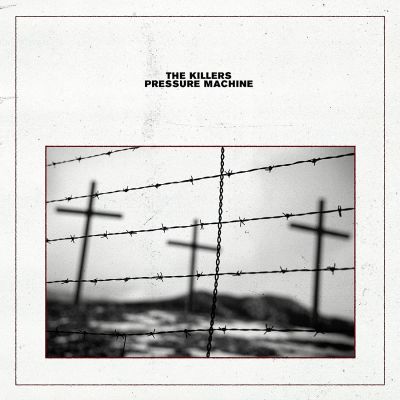When Brandon Flowers sang, “Who’s the man? I’m the man,” we knew it was satirical, the fun but appropriate tongue-in-cheek declaration from the front man of a band known for bombast and bravado. But we also smiled, because we knew that Flowers was, at least a little bit, singing to the critics who feel morally obligated to include the phrases “overblown” and “grandiose” in every review of a Killers album. You know, the ones who roll their eyes and write, “’Are we dancer?’ OMG, that’s not even good grammar.” (Can we all just get over it, please?)
How surprising, then, for the band to produce an album with the anti-bombast of Pressure Machine. Sure, it’s a pandemic album, and Taylor Swift got all low-key with Folklore and Evermore, but what makes Pressure Machine so remarkable is not just the sound, not just the caging of the anthemic tigers named Bowie and Mercury. It’s the humanity of the record. Maybe we’re not dancer after all.
What makes 'Pressure Machine' so remarkable is not just the sound, not just the caging of the anthemic tigers named Bowie and Mercury. It’s the humanity of the record.
In telling the tales of small-town Utah, Flowers connects us to real people with whom we identify, because the struggles they face are invariant to place. This is not the first “small town” record, and it’s not the first time Flowers has had Nebraska in his sights instead of Born to Run. Rarely, though, do those rural Americana albums strike such a perceptive balance between the promises and problems of places like Nephi, Utah. And to his credit, rarely has a singer captured these stories as well as Flowers.
Utah is steeped in Mormonism, so it makes sense that Pressure Machine is steeped in spirituality. From the recorded clip of a local resident affirming “higher powers, higher powers,” to the protagonist of “The Getting By” who looks up and sees “only sky,” the inhabitants of the record embody eternal beliefs and doubts. What they’re searching for, though, is more than the existence of Deity; it’s the existence of grace.
The title track aims its pressure cooker at the Kingdom of God, and equates the idyllic life of the small town with the sort of “good behavior” that some religions believe will punch your ticket to the hereafter. This is the version of morality that makes the stories of the album so tragic. Here is the suicidal kid who has been shunned by a small town’s judgment. Here is the adulterous cop who knows he’s rationalizing his sin and the tempted husband sees no blessings in his lonely life. Here is lost innocence and wanderlust and abandoned dreams. The silver-gilt prayers of the small town girl are lost when the hard wind of life dulls the shine. The circumstances and the reactions to them beget judgment, guilt, and sadness. “But my people were told they’d prosper in this land.”
But then here is a jailed opioid addict who declares, in the face of all this failure and judgment, “When He pulls my chart, He’ll reject my actions but He will know my heart.” The dichotomy of a small town’s charms and its darkest hidden shadows is as sharp as the dichotomy between the judgment of those shadowlands and the bright charm of grace. Both are found in the album’s strongest symbols: the train is damnation, and the horses are the freedom that knows the Heart.
This visit to Nephi, and these microcosmic portraits of its people, are a gift to a struggling world and a roundabout lesson on the virtues of grace.
Some Killers fans won’t be crazy about Pressure Machine. I suppose those people are dancer after all. But on the whole, the band has never been so down to Earth. The guitars are back. (I’m still not sure if they let an eager Dave Keuning return or if he finally decided to show up.) The vocals are as good as they’ve ever been. (I hereby nominate the line “I close my eyes and think of the water” for the Best Vocal Grammy. And oh, my goodness I want a whole album of Brandon Flowers and Phoebe Bridgers duets.) Even a song like “Sleepwalker,” with its less interesting mid-tempo soundtrack, is so remarkably sensitive and caring, I want to drive to Utah right now. It’s “Dear Prudence” with more heart.
I’ve always loved it when the Killers go big. Over-the-top lyrics like “lightning fields of love” will always make me smile, and I hope the band doesn’t stay low-key forever. But this visit to Nephi, and these microcosmic portraits of its people, are a gift to a struggling world and a roundabout lesson on the virtues of grace.


